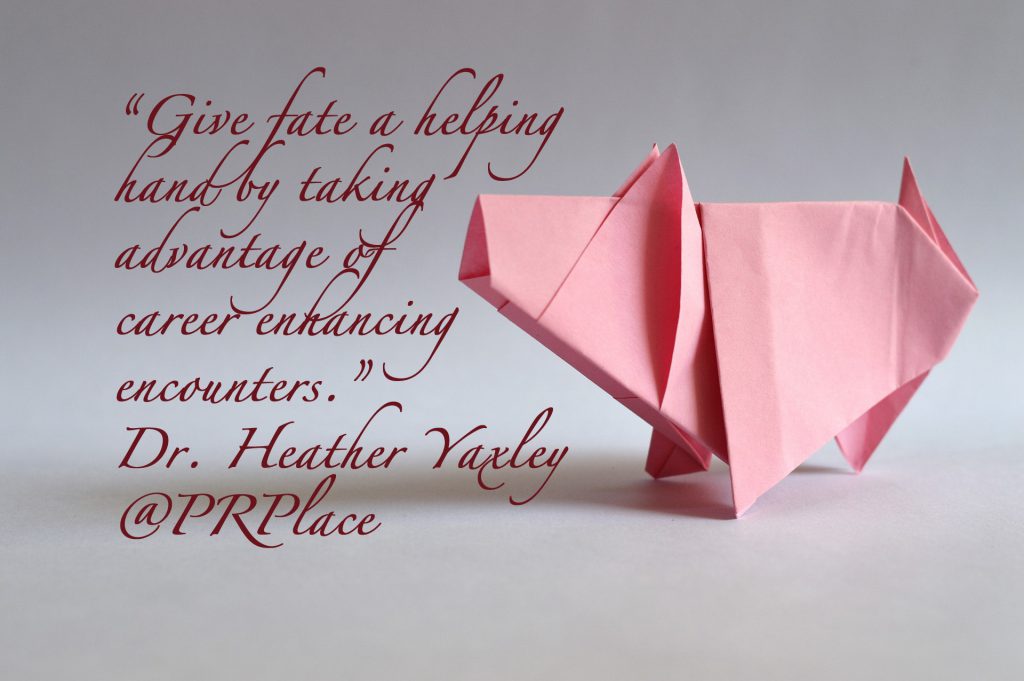Ask Dr Heather Yaxley

About the author
Heather is a key member of our assessor team. PhD, BSc, PG, RSA, CAM

In her first PR Place column of 2019, Dr Heather Yaxley looks at opportunities and challenges in managing new career beginnings.
I’d set myself a New Year resolution to make changes to my career. But I’m so busy at work that I haven’t yet got round to even thinking about what moves I could make. What’s the best way to get started?
Just like careers, a year comprises many beginnings. January is the traditional time for change and renewal (reflecting the month’s dedication to Janus – the Roman god of gateways and beginnings). We set resolutions and tackle 30-day programmes to improve our health, wealth and fitness. Yet by design or circumstance, most of us fail to achieve our best intentions. In this you are not alone.
Of course, February offers they chance for a fresh beginning. Historically it is the month of purification, making it the ideal time for a clean slate. The start of the Chinese New Year – the Year of the Pig – this month provides another trigger to consider what’s in store for your career in the year ahead.
Putting together a plan involving SMART career goals and steps to achieve these is the best approach. However, my research reveals that PR practitioners typically develop their careers in an opportunistic way. As busy people they rely on chance – being offered a promotion, facing job redundancy, hearing about a vacancy or spotting a recruitment post in social media.
If this applies to you, my recommendation is to give fate a helping hand by taking advantage of career enhancing encounters. Here are three ways of doing that:
- Look for at least one opportunity a month to catch up with someone in your existing network of contacts by phone or in person.
- Volunteer for projects at work that enable you to meet new people, gain new skills and raise your profile.
- Internal career moves often rely on someone mentioning your name, so find a reason to talk with, or help out, senior colleagues in your organisation on a regular basis.
I’m graduating from uni this summer and have started thinking about first job options. What’s your advice in securing a graduate role?
Be selective in your applications, and manage each one professionally. Applying for any role you spot can be tempting but a scattergun approach is rarely successful.
Think about what you want from a career. If you would prefer a structured career pathway, look for graduate roles offered by larger employers. These include consultancies, as well as organisations in the public and private sector. There is likely to be tough competition for these posts, so you need to stand out at each stage. Optimise your CV/resumé for applicant tracking systems (ATS), and practice for various types of tests, tasks and interview questions.
If you are more open to how your career may develop, focus on opportunities that open up future choices. Be prepared to take a chance with smaller employers, start-ups, those outside the main cities, or in less popular sectors. Show these recruiters that you are enthusiastic, offer something unique, are prepared to work hard and will develop quickly.
I work in the public sector and have been offered a promotion to head up the corporate communications function, when my boss retires in six months’ time. My career to date has been in journalism and running a busy press office. I’m excited about taking on new responsibilities, but concerned I’ll be out of my depth. How can I prepare for this move into a senior management role?
Congratulations. It is really useful to have time to prepare for the move. This will enable you to work closely with your boss, review the corporate communications strategy, and consider your professional development needs. The Global Alliance has developed a Capability Framework (available from the University of Huddersfield) based on extensive research into PR and communication management. This maps communication, organisational and professional capabilities and can be used as a reflective checklist to identify your priority learning areas. Studying for the CIPR Professional PR Diploma with PR Academy would provide a solid foundation in strategic PR/communications management, with the opportunity to focus on your organisation for your assignments.
I’ve read the PR Place Guide to Reflective Practice and am interested in how I can begin to adopt this approach in developing my career.
A recent Institute for Public Relations article by Bruce Berger reported research underlining the importance of self-awareness and self-reflection for those working in public relations leadership roles. In response to the article’s call for greater focus in this area, I am launching a reflective practice programme. This features an easy to follow regime to develop reflective habits in ten areas over a ten-week period. There will be a range of resources including questionnaires, worksheets, reading recommendations, action plans, top tips, and career notes. Anyone who is interested in knowing more should send me a message at LinkedIn or connect via Twitter (@Greenbanana) and I will let you know when and where you can sign up.